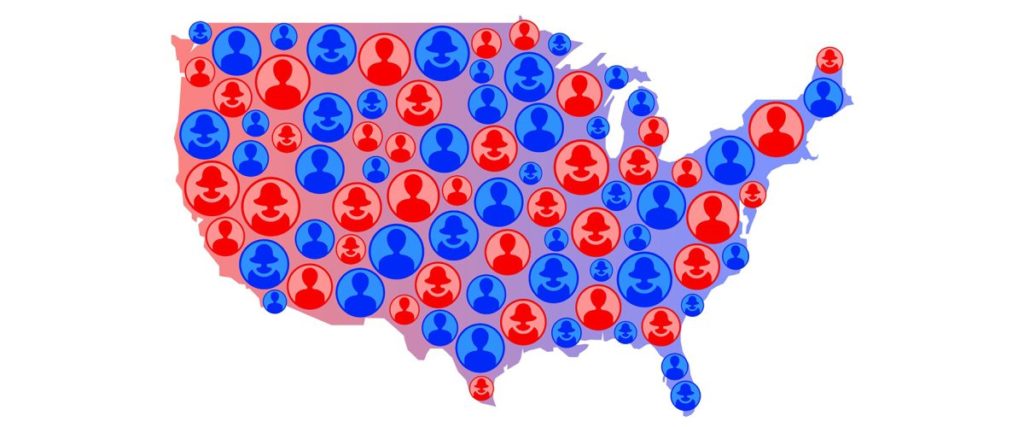On the morning after, with more results still to come in, so far the most important takeaway from the midterm elections is that Donald Trump keeps hurting the Republican Party, whose soul he has eaten, and this is grounds for hope.
It is an unrelenting rule of American politics that the party that holds the White House loses ground in the next midterm elections. This year add a president with a 44% approval rating and an economy suffering from high inflation. The Republicans should have decisively flipped control of the House and Senate under these conditions and should have made gains in governors’ races. They have not done so. The red wave has become a barely pink puddle.
Why has this happened?
Donald Trump.
First, because Trump intervened in a number of Senate races and a handful of gubernatorial races to endorse celebrity favorites (like Herschel Walker and Dr. Oz) and scary, sometimes mean, out of the mainstream hardliners like Doug Mastriano in Pennsylvania, Blake Masters and Kari Lake in Arizona, and Tudor Dixon in Michigan.
The main qualification to get Trump’s endorsement appeared to be, besides celebrity, a willingness to deny the validity of the results of the 2020 presidential election and to threaten a fair count in 2024. Obsequious statements of personal devotion to Trump were also a must. This did not prove a winning formula in the general election, and a number of winnable races for the Republicans slipped away from them.
I am especially pleased that in the five swing states that will likely decide the 2024 presidential election, gubernatorial candidates whose words fairly amounted to a threat to a fair count lost in Pennsylvania, Michigan and Wisconsin, and may lose in Arizona. Meanwhile, in my home state of Georgia, the Republican Brian Kemp won, having resisted Trump’s entreaties to overturn the 2020 election and having crushed Trump’s anointed primary challenger, former senator David Perdue.
“For those of us whose primary concern going into this election was whether the core democratic practice of fair elections in which every vote is counted would survive, we are breathing easier today.”
For those of us whose primary concern going into this election was whether the core democratic practice of fair elections in which every vote is counted would survive, we are breathing easier today. Trump’s intervention actually aroused the resistance of a considerable portion of the electorate and secured fair elections in major swing states for the next four years.
The other issue that appears to have swung many voters toward the Democrats was the Supreme Court’s overturning of a national right to abortion. This abolition of a 50-year precedent shocked many into mobilizing to restore the lost rights or prevent their further erosion, at both state and national levels. Both state-level referenda in conservative states like Kansas (and now Kentucky!) as well as various elections show a highly motivated group of voters on the pro-choice side, including a large share of young voters, both women and men.
This outcome is also directly connected to Donald Trump, because as president he nominated the three jurists who became votes for overturning Roe v. Wade.
My view long has been that the Republican game on abortion was clear, for many elections: gain votes by promising to roll back abortion, and then fail to deliver, partly by nominating Supreme Court justices who, in the end, did not overturn the old precedent. This had the salutary political benefit of making the same strategy available in the next election. This strategy worked from Ronald Reagan through George W. Bush.
But it ended with the Dobbs decision, which was made possible, in part, by Trump nominating three judges who turned out to be uninterested in playing the old game — and whose epochal decision changed U.S. politics.
Watching legislation develop since this summer and listening closely to women and couples in states where abortion (and related health care) access has been restricted, has made it more clear to me than ever that women’s health care choices during pregnancy are too vital, personal and complex to be taken away from them by legislators sitting in capitol buildings.
Anti-abortion laws also seem to limit women from having full access to essential health care options for various pregnancy-related crises and complications that never seem to be accounted for in legislation. These laws also block health care practitioners from being able to provide the care that is most appropriate to every situation, a professional ethical obligation for all such professionals.
And this is not even to begin the conversation about freedom of conscience and religion, which already is in the process of being trampled in many states as a particular kind of religious vision about abortion is imposed on every citizen. Whatever one’s feelings about the morality of abortion, these are fundamental considerations related to public policy.
Agree with me or not on this matter, at the political level these existentially profound considerations are leading to active political mobilization at this moment and help to account for the surprising outcomes in various elections yesterday.
A fever has gripped our national politics for a while now. It has been a frightening time. Our democracy itself has been threatened. At least as of the morning after the midterms, I am more hopeful than I have been since 2016.
This article first appeared on Baptist News Global.


I was going to write, “You can’t possible know…” but I think you may know…your SANE words right now mean so much! I’ve read your other books and look forward to this one. Thank you, David Gushee…for allowing yourself to be a light in the world.